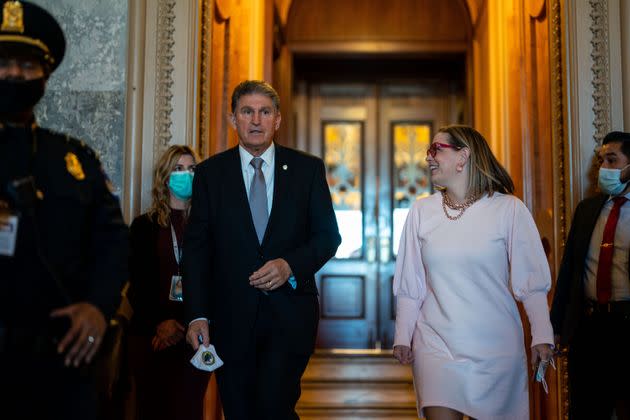House Passes New Voting Rights Bill In Bid To Set Up Final Senate Showdown
- Oops!Something went wrong.Please try again later.
- Oops!Something went wrong.Please try again later.
- Oops!Something went wrong.Please try again later.
The House of Representatives voted 220-203, with all Democrats in support and all Republicans opposed, Thursday morning to pass a new voting rights bill called the Freedom to Vote: John R. Lewis Act as part of a plan to put the bill on the floor of the Senate for a final showdown over the chamber’s filibuster rules.
The plan to force a vote on changing Senate rules is the latest development in a one-year odyssey for voting rights legislation that Democrats have been pushing as their top legislative priority. The legislation gained increasing importance for Democrats over the past decade as Republican state legislatures across the country enacted new laws restricting voter access, especially in the last year based on former President Donald Trump’s lies about election fraud. In addition, the conservative-packed Supreme Court voted again to gut the landmark Voting Rights Act of 1965 in a 2021 ruling.
All three bills put forward by Democrats in 2021 ― the For the People Act, the Freedom to Vote Act and the John R. Lewis Voting Rights Advancement Act ― were aimed at reversing these trends, but they all met the same fate. Republicans blocked the Senate from even holding a debate on each bill by invoking the filibuster, which requires a 60-vote supermajority to overcome.
Senate Majority Leader Chuck Schumer’s plan to get around the filibuster on voting rights legislation gives Democrats a final put-up-or-shut-up moment. Can Schumer get all 50 members of his caucus to support a change to the Senate filibuster rules to enable voting rights legislation to pass? Or will Sens. Joe Manchin (D-W.Va.) and Kyrsten Sinema (D-Ariz.) stick to their long-held positions in support of existing filibuster rules that have made almost every bill subject to a 60-vote threshold in recent years? These questions will likely be answered by Martin Luther King Jr. Day.

The new legislation contains the provisions of the Freedom to Vote Act that would expand and protect voter access, reform redistricting and campaign finance, and protect against election subversion. It also includes provisions of the John R. Lewis Voting Rights Advancement Act that would restore elements of the Voting Rights Act gutted by the Supreme Court and also includes new protections for voting rights in Native American communities.
This bill will reach the Senate floor through a convoluted process that begins with the House passage Thursday morning of a bill to give NASA new authority to lease property. House Democrats will bring the NASA bill for a vote and amend it by attaching the Freedom to Vote: John R. Lewis Act to it. Since the NASA bill had previously passed the House and been amended and passed in the Senate, it will go directly to the floor of the Senate, bypassing the filibuster on the motion to open debate, so that debate can begin. The bill will still be subject to a 60-vote threshold on a motion to end debate and move to final passage. If Republicans filibuster the bill, as they are expected to do, Schumer will move to change the Senate rules by a simple majority vote, the same process used by past majority leaders Harry Reid and Mitch McConnell when they eliminated the filibuster for judicial and executive branch nominations.
It did not seem likely, however, that Democrats were able to convince their two publicly dissenting senators to back changes to the rules ahead of the votes.
“As of this morning, we’re not where we need to be to have them on board,” Sen. Jon Tester (D-Mont.), who has been involved in negotiations with Manchin, said at an event hosted by the Center for American Progress Action Fund on Wednesday. “But I continue to be hopeful.”
Tester added that he and his negotiating partners, Sens. Angus King (I-Maine) and Tim Kaine (D-Va.), would “continue to use every persuasion power that I have to move the ball forward, to get everybody, all 50 of us, to a point where we can get this Freedom to Vote Act passed.”

Schumer similarly noted the difficulty of convincing Manchin and Sinema of the need to change Senate rules at a CAP Action Fund event on Tuesday.
“I don’t want to delude your listeners, this is an uphill fight, because Manchin and Sinema do not believe in changing the rules,” Schumer said.
There is still time, and voting rights advocates and Senate leadership hope that their final push will be able to convince Manchin, who helped write the Freedom to Vote Act, and Sinema, who co-sponsored the legislation, to reconsider their opposition to altering Senate filibuster rules for voting rights legislation.
Manchin did lay out some filibuster changes that he could support on Tuesday. But these changes would not likely lead to the passage of voting rights legislation.
The major themes that Democrats are pushing in their final effort to pass legislation have been pressed over the past year by first-term Sen. Raphael Warnock (D-Ga.): that Republican state legislatures are able to enact voter suppression laws on party-line votes, yet the Senate cannot respond in kind due to the filibuster. This is in spite of constitutional provisions authorizing Congress to enact national legislation protecting the right to vote.
“State legislatures can pass anti-voting laws with simple majorities,” President Joe Biden said in a speech calling for changes to the Senate’s filibuster rules in Atlanta on Tuesday. “If they can do that, then the United States Senate should be able to protect voting rights by a simple majority.”
From the beginning of the push to pass voting rights legislation, Schumer declared that “failure is not an option.” That will finally be put to the test in the coming days.
This article originally appeared on HuffPost and has been updated.



